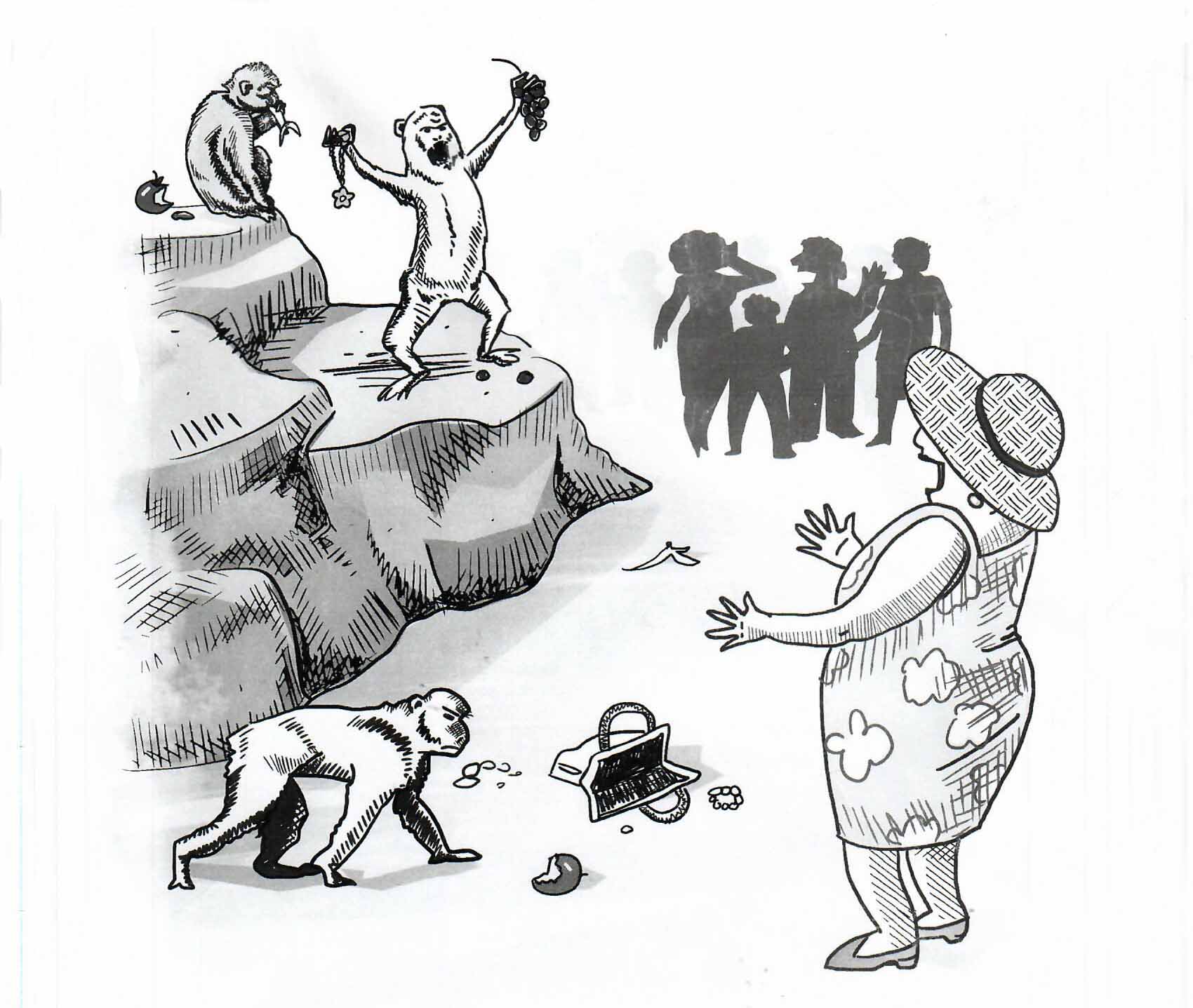The Rock Hotel balanced itself precariously on its perch halfway up a hill, on Europa Road, as narrow as an alleyway. Its squat, sparkling-white structure sprawled across the hillside exuding an image of the white cliffs of Dover—appropriate, being Great Britain’s last outpost in Europe.
As we tumbled out of the Rock onto the barely foot-wide pavement, there was ne’er a pedestrian in sight. It was siesta time. Who would be parading the streets in this hot afternoon weather anyway, except tourists? We stayed on our downhill curving path. Tall trees hovered over us from behind walled gardens of old stone houses, stacked one against the other. Here and there, narrow black iron gates broke the monotony. Through their grilles, we saw small, shaded, tile-covered courtyards leading to porticos within. Purple and crimson bougainvillea sprouted along wooden trestles. Large pots exhibited a plethora of chrysanthemums of burnished gold, sky-blue, and pale lime green.
An archway lay at the bottom of the road—the gateway into the town.
Within minutes, we were in front of Marks & Spencer.
“Wait here,” I pointed to a bench. “I’ll be right back.”
I dashed in and took the escalator to the basement food department. When I got there, I gasped. The shelves were bare.
“What happened?” I asked the cashier in alarm.
In a tone of sheer hopelessness, she murmured, “Two cruise ships hit port at the same time. Their passengers bought the lot. If only you’d come an hour ago.”
It seemed a plague of locusts had descended, leaving nought in their wake. The sight of empty shelves and endless line-ups on an island of barely seven square miles repeated itself wherever we went.
Progressing towards the quaint town square, the stores were even tinier, filled with watches and jewellery at bargain prices. Limestone hills dominated the sleepy square, out of which locals had carved caverns of artisan workshops. Gibraltar’s great attraction lay in its tax-free status. Once a boon to the locals in enticing tourists beyond rowdy, well-oiled matelots, acting solely as a way station for the British Royal Navy, Gibraltar’s tax-free status became a curse. As well as being the untrammelled domain of bargain-hungry tourists, Gibraltar was now the residence of the world’s super-rich.
From the square, a path led to a marina. Here, the island’s centuries-old architecture was eschewed, replaced by towers of luxury condominiums and glittering glass facades of professional buildings housing lawyers and accountants required to quench the all-consuming appetites of their billionaire clients for even more wealth. Unbeknownst, we entered the glitz and glamour of Hollywood. Multi-million-dollar yachts, larger than our home in Canada, littered the marina. A steppingstone away, restaurants just shy of a Michelin star, hid in the shade of alleyways, always open to the dictates of their patrons.
Our walk through the sun-drenched afternoon left us exhausted.
“Hon, can we take a taxi home?” Laura pleaded. Her shoulders drooped under the weight of multi-coloured, hand-blown glass goblets purchased to fill her China cabinet.
A red minibus, empty of passengers came to a halt in front of us.
“Wanna a lift?” the driver enquired. Although his English idiom was flawless, the slight burr of accent acquired by years of living beside Spain, marked him as a native.
We climbed aboard, dropping into our seats in relief. Ascending a hill soon after, I nudged Laura, “Look, there’s the airport.” It was built on reclaimed land to the north, bordering Spain, their age-old enemy. Traffic crossed the runway to get from Spain into Gibraltar and vice-versa. The road was barred by a wooden arm as it would have been at any ordinary crossing. An endless line of cars in both directions waited patiently for a plane to land as did dozens of pedestrians glancing nonchalantly as it whizzed past them only a few feet away.
Round a bend, we saw the town on one side and, well below them on the other side, pristine sandy beaches with not a tourist in sight. The last bastion of the island’s browbeaten populace.
At the highest point, the bus came to a halt.
“We’ll be here for twenty minutes,” the driver announced. “Go visit our monkeys.”
With no hesitation we took up his offer, leaving all our treasures with a complete stranger.
A dozen monkeys congregated on an open oblong slab of concrete. They were surrounded by tourists. A baby monkey jumped onto the shoulder of an elderly lady clutching a walking stick. While she was distracted, hordes of sightseers recorded the action for posterity with their Leicas and iPhones. Seizing their opportunity, the rest of the monkeys scattered and raided the tourists in a well-coordinated smash-and-grab manoeuvre. A handbag, some colourfully-loud jewellery and fruit were carried away, leaving their victims astonished and bewildered by their fate. In total disarray, they turned to seek help. There was none. Meanwhile, the monkeys, perched atop rocks a hundred feet out of reach, fought over the spoils. Then, the monkey with the handbag returned, dumping the bag in front of him and stared at the owner as if inviting an exchange.
I couldn’t help smiling at the monkey attempting to dictate terms. My heart went out to the mischief-maker in kindred spirit. In younger days, I too had stood my ground to gain control of my own destiny. I so wished the Gibraltarians do the same.
“Pops, look!” My two boys howled with laughter. “See what the monkey did with the handbag?”
For a couple of apples and a bunch of grapes, the monkey had capitulated, leaving the handbag in his wake as he retreated, his hands full of booty, back to his community atop the rock. The crowd of tourists dispersed quickly and quietly, clutching their goods and valuables tightly to them, constantly peering over their shoulder on the lookout for further attacks. There were none.
I heard a honk. The bus driver was waving us back. We sat down, our laps overladen with goblets, gifts, and gimcracks.


